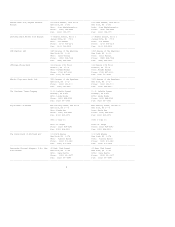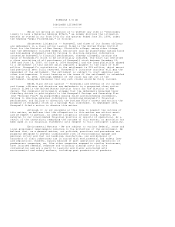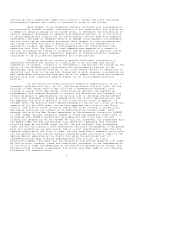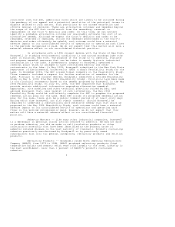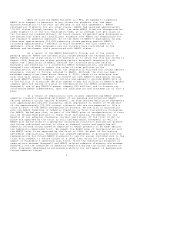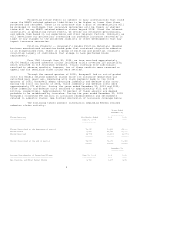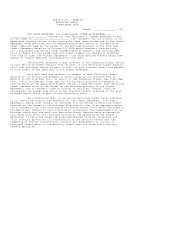Honeywell 2004 Annual Report Download - page 218
Download and view the complete annual report
Please find page 218 of the 2004 Honeywell annual report below. You can navigate through the pages in the report by either clicking on the pages listed below, or by using the keyword search tool below to find specific information within the annual report.and recorded a charge of $1.4 billion for NARCO related asbestos litigation
charges, net of insurance recoveries. This charge consisted of the estimated
liability to settle current asbestos related claims, the estimated liability
related to future asbestos related claims through 2018 and obligations to
NARCO's parent, net of insurance recoveries of $1.8 billion.
The estimated liability for current claims is based on terms and
conditions, including evidentiary requirements, in definitive agreements with in
excess of 90 percent of current claimants. Settlement payments with respect to
current claims are expected to be made through 2007.
The liability for future claims estimates the probable value of
future asbestos related bodily injury claims asserted against NARCO through 2018
and obligations to NARCO's parent as discussed above. The estimate is based upon
the disease criteria and payment values contained in the NARCO Trust
Distribution Procedures negotiated with the NARCO Committee of Asbestos
Creditors and the NARCO future claimants representative. In light of the
uncertainties inherent in making long-term projections we do not believe that we
have a reasonable basis for estimating asbestos claims beyond 2018 under
Statement of Financial Accounting Standards No. 5. Honeywell retained the expert
services of Hamilton, Rabinovitz and Alschuler, Inc. (HR&A) to project the
probable number and value, including trust claim handling costs, of asbestos
related future liabilities based upon historical experience with similar trusts.
The methodology used to estimate the liability for future claims has been
commonly accepted by numerous courts and is the same methodology that is
utilized by an expert who is routinely retained by the asbestos claimants
committee in asbestos related bankruptcies. The valuation methodology includes
an analysis of the population likely to have been exposed to asbestos containing
products, epidemiological studies to estimate the number of people likely to
develop asbestos related diseases, NARCO claims filing history, the pending
inventory of NARCO asbestos related claims and payment rates expected to be
established by the NARCO trust.
Honeywell has approximately $1.4 billion in insurance limits
remaining that reimburses it for portions of the costs incurred to settle NARCO
related claims and court judgments as well as defense costs. This coverage is
provided by a large number of insurance policies written by dozens of insurance
companies in both the domestic insurance market and the London excess market. At
June 30, 2004, a significant portion of this coverage is with insurance
companies with whom we have agreements to pay full policy limits based on
corresponding Honeywell claims costs. This includes agreements with a
substantial majority of the London-based insurance companies entered into
primarily in the first quarter of 2004. We conduct analyses to determine the
amount of insurance that we estimate is probable that we will recover in
relation to payment of current and projected future claims. While the
substantial majority of our insurance carriers are solvent, some of our
individual carriers are insolvent, which has been considered in our analysis of
probable recoveries. In the second quarter of 2004, based on our ongoing
evaluation of our ability to enforce our rights under the various insurance
policies, we concluded that we had additional probable insurance recoveries of
$47 million, net of solvency reserves, which has been reflected in insurance
receivables. We made judgments concerning insurance coverage that we believe are
reasonable and consistent with our historical dealings with our insurers, our
knowledge of any pertinent solvency issues surrounding insurers and various
judicial determinations relevant to our insurance programs.
5





